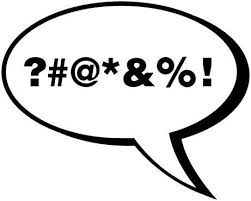A recent study has revealed that occasional swearing can be beneficial to emotional well- being. It has also highlighted that traditional perceptions of foul language are wrong.
being. It has also highlighted that traditional perceptions of foul language are wrong.
The study had participants endure frustrating and mildly painful situations, in order to look at the differences in reaction when swearing was involved. Those who voiced expletives ended up with lower blood pressure, probably due to the effects of being able to externalise and vocalise their anger: the definition of “letting off steam”.
Those who didn’t swear internalised their frustration, becoming increasingly annoyed as the experiment wore on.
This contradicts some earlier claims from therapists and pain management experts who believe that internalising pain and calmly breathing through it is the best way to manage it, and that shouting about it only makes it worse.
The study also showed that despite the belief that swear words are used by less educated people, in fact the opposite is true. It found that those with higher intelligence levels were more likely to swear, albeit in moderation.
What is a Swear Word?
A swear word is simply a word that is seen as taboo. These can change from town to town, and from family to family. Following this study, swearing was labelled as a “harmless emotional release”.
Despite this, certain words are still frowned upon and broadcasters will go to great lengths to avoid using the most prevalent ones in their programmes. Vladimir Putin, President of Russia, has introduced a fining system throughout his nation in the hope of removing swear words from the public face of the Russian language.

